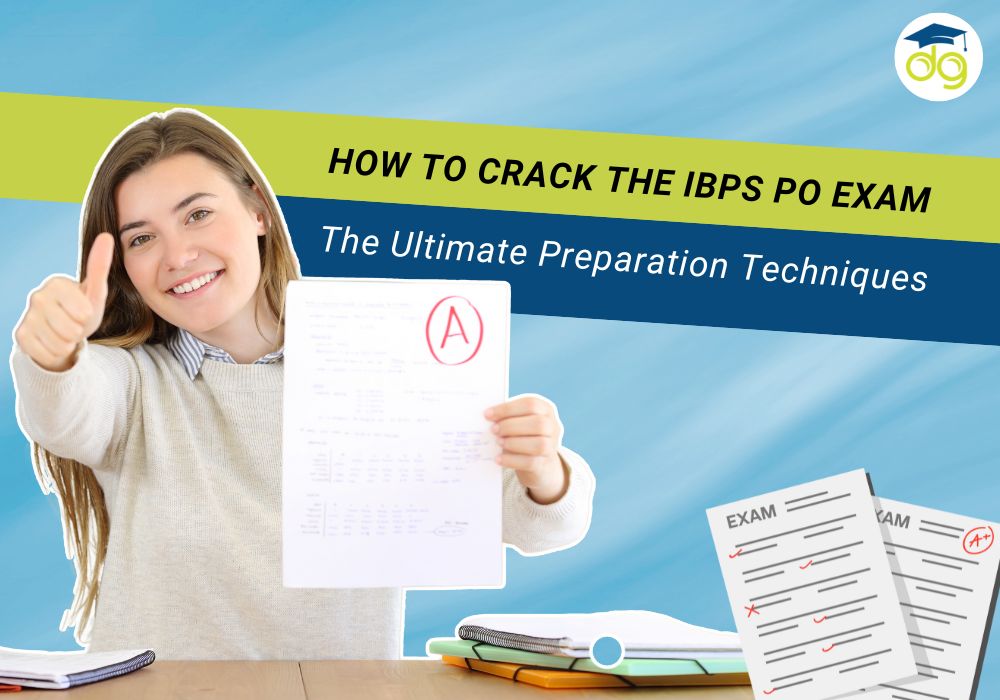How to Crack the IBPS PO Exam: The Ultimate Preparation Techniques
Step-by-Step Guide to Ace IBPS PO with Smart Preparation Techniques
The IBPS Probationary Officer is considered to be one of the most demanded competitive exams in the aspirants who are eager to shape their careers in the banking sectors. Every year, Lakhs and Lakhs candidates across India compete for limited numbers of seats. Though the competition is very tight, cracking the IBPS PO can be possible with proper preparation, strategy, and mental makeup.
In this detailed guide, we will take you through the essential steps in preparation, tips, and resources that will help you crack the IBPS PO examination with surety. But if you actually implement the suggestions made in this blog post, you're more than likely headed for success.
Step 1: Know the exam pattern and syllabus
The first step to effective preparation is to know inside out the exam pattern and syllabus. The IBPS PO exam is conducted in three stages: the Prelims, the Mains, and the Interview. Let's break down the details of each phase:
Prelims Exam
The Prelims is an objective-type exam designed to test your speed and accuracy. The sections in the Prelims exam include:
English Language: 30 questions, 30 marks
Quantitative Aptitude: 35 questions, 35 marks
Reasoning Ability: 35 questions, 35 marks
There are 100 questions in total, and you have 60 minutes to complete the test. As it's a qualifying test, your objective during Prelims should be to secure above the sectional and overall cutoffs. The time limit for each section is fixed, so your most significant challenge is managing time.
Main Examination
The Mains exam is broader, challenging your reasoning ability along with your knowledge of banking and economic trends. The sections in the Mains exam are as follows:
Reasoning & Computer Aptitude: 45 questions, 60 marks
General/ Economy/ Banking Awareness: 40 questions, 40 marks
English Language: 35 questions, 40 marks
Data Analysis & Interpretation: 35 questions, 60 marks
Descriptive Writing: 2 questions, 25 marks
You will get 155 questions in total and you have 3 hours to attempt this exam. This round is intense in terms of complexity with greater importance on knowledge about the concept, especially compared to other sections like data interpretation and general awareness.
Interview Round
After clearing the Prelims and Mains, you’ll be called for the interview round, which evaluates your personality, communication skills, and suitability for the role of a Probationary Officer. The interview usually carries 100 marks, and your combined score from the Mains and the Interview is used to determine your final selection.
Syllabus Overview
The syllabus for each section of the IBPS PO exam is quite extensive, and one needs to cover all these topics for sure success. Some of the key topics under each section are as follows:
Quantitative Aptitude: Number Series, Simplification, Data Interpretation, Time & Work, Profit & Loss, Probability, Averages, Percentages, etc.
Reasoning Ability: Coding-Decoding, Blood Relations, Direction Sense, Syllogism, Puzzles, Seating Arrangement, and more.
English Language: Reading Comprehension, Vocabulary, Sentence Correction, Para jumbles, Cloze Test, etc.
General Awareness: Banking terms, RBI Guidelines, Financial Awareness, Current Affairs related to national and international events, Economic News, etc.
Descriptive Writing: Letter Writing, Essay Writing, and Precis Writing.
Step 2: Develop a Smart Study Plpan
The key to cracking the IBPS PO exam is having a clear, well-structured study plan. Without a plan, preparation may become aimless and result in confusion and stress. Here's how you can structure your study plan:
Prioritize the Topics
Identify topics that carry more weight in the exam and those where you are weak. Focus on mastering basic concepts of Quantitative Aptitude, Reasoning Ability, and English Language first since these are the core areas of the Prelims and Mains.
Break Down the Syllabus
Have a goal for every week or month and adhere to it. If you have three months to the exams, then plan on finishing the whole syllabus well before the last month and then dedicate the last month to revision and mock tests. Be sure to allocate time to each subject you are taking and do not forget a section.
Time Management
The IBPS PO is a time-bound test, so time management practice is important. Set fixed times for study every day and strictly adhere to them. Do include breaks to avoid burning out but ensure your study hours are productive. A good practice will be to divide your time into three categories:
Mock tests are your closest friend while preparing for a competitive exam. They do not only help assess your strength and weakness but also get you trained in the actual exam's pattern as well as under time constraints. Regular sitting for mock tests will always enhance your speed, accuracy, and decision-making ability during the examination process.
Step 3: Focus on Time-Saving Strategies
In an IBPS PO exam, it is the time management that decides your fate. Here is how you can maximize your efficiency:
Read the Questions carefully: Read every question carefully and pick out the easier ones first. You shouldn't spend too much time on tough questions.
Use Shortcuts and Tricks: You must find shortcuts for your quantitative aptitude as well as reasoning ability which you can use in solving questions quickly without losing precision.
Skip Tough Questions First: If you find a question difficult, skip it for the time being and revisit it later on. Make sure that you are answering easier questions first to make the most of your score.
Step 4: Revise and Keep Updating
Revision is the way. You may read a lot, but if you do revision properly, concepts will remain fresh in your mind. Make a schedule for the last month before the exams which allows you to revise all the important topics and formulas.
Equally as important are updates on current affairs. The general awareness section focuses strictly on banking and finance and on anything that has happened over the previous six months. Develop a practice of reading the newspaper regularly, following financial and banking blogs, and watching news programs that keep you informed about events in the country and the world at large.
Step 5: Prepare for the Interview
Once you clear Prelims and Mains, the final challenge will be interview. In this round, the interview panel will assess your personality, communication skills, and overall suitability for the role of a Probationary Officer. Some tips for acing the interview: Know your resume: One must be prepared to discuss educational background, work experience (if any), and why they want to pursue their career in banking.
Stay Calm and Confident: The interview panel will assess your ability to remain composed and answer questions confidently.
Stay Updated on Banking and Economic News: Be aware of current trends, policies, and developments in the banking sector. This shows your interest and dedication to the field.
Conclusion
Therefore, cracking the IBPS PO requires a lot of dedication, a properly planned study schedule, and regular practice. If you are seeking extra help, one-on-one guidance, and high quality study material, Skoodos Bridge is where you should come to get all this and much more. Skoodos Bridge offers you mock tests, expert coaching, and a community of motivated aspirants, keeping you on the right path. And now, with the proper tools and resources, your dream to become an IBPS PO can well and truly become a reality.
Visit Skoodos Bridge today and take the first step towards your banking career!
All the best for preparation.
Frequently Asked Questions (FAQs)
1. What is the minimum age required to apply for the IBPS PO exam?
The age of the candidate should be between 20 to 30 years as on the date specified in the official advertisement. Age relaxation is applicable for candidates belonging to the SC/ST and OBC categories.
2. Is there any negative marking in the IBPS PO exam?
Yes, there is a negative marking. For every incorrect answer, one-fourth of the marks assigned to the question would be deducted.
3. How many times can I attempt for the IBPS PO exam?
There is no specific number of attempts for a general category candidate. However, if it is within the age limit for his category, he can appear multiple times. The age relaxation facility for the reserved category candidates allows them more attempts.
4. What would be best way to boost my speed for the exams?
She suggests practicing with time-bound mock tests regularly to build up speed. One should focus on learning shortcuts and tricks for solving problems quickly in areas like Quantitative Aptitude and Reasoning.
5. How important is the Descriptive Writing section?
The Descriptive Writing section is crucial, especially in the Mains exam. Though it carries less marks compared to objective sections, being strong in this section can give you an edge over others in the competition.
Categories
Archives
Similar Posts

Parent Communication Strategies for Managing Exam Family Pressure
by Skoodos Bridge

Time Zone Study Scheduling for Indian Students in Global Coaching
by Skoodos Bridge

Budget Breakdown: Cost Analysis of Top JEE Coaching Institutes 2025
by Skoodos Bridge

Color Psychology in Note-Taking for Better Memory and Learning
by Skoodos Bridge

Mirror Neurons and Group Study: The Psychology Behind Collaborative Learning
by Skoodos Bridge

Music Therapy for Concentration: Playlists to Boost Focus While Studying
by Skoodos Bridge

Dopamine Hacking for Study Motivation: Neuroscience-Based Exam Prep
by Skoodos Bridge

Electric Vehicle Jobs: Top Mechanical Engineering Careers in EV Sector
by Skoodos Bridge

EdTech Careers After Engineering: Build Learning Apps & Startups
by Skoodos Bridge


Leave a Comment